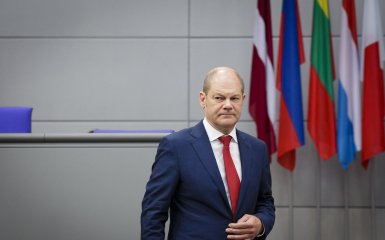The controversial decisions of German Chancellor Olaf Scholz regarding military aid to Ukraine are driven by a deep fear of Russia and a desire for Ukraine to agree to negotiations with it as soon as possible.
Scholz is embarrassing his European allies
Politico journalists write that Scholz's refusal to supply long-range Taurus missiles to Ukraine embarrassed Germany's European allies.
He explained his refusal by the risks of Russian revenge, while at the same time reproaching the allies for insufficient military aid to Ukraine.
Politico writes that angry reactions to the chancellor's perceived inconsistency have been on display in recent days, particularly as European allies try to show rhetorical resolve in helping Ukraine.
Europe clearly faces a moment when it will be necessary not to be cowards, Macron said this week.

Emmanuel Macron
President of France
His comments appeared to be directed at Scholz.
Scholz’s behavior has showed that as far as the security of Europe goes he is the wrong man in the wrong job at the wrong time, former UK Defence Secretary Ben Wallace said last week.
What is Scholz's strategy?
Politico writes that at first glance, Scholz's inconsistent behavior is a well-thought-out strategy.
Since Scholz realised that Ukraine could defend itself against Russia, his strategy was to act in concert with the US, supplying Ukraine with weapons and equipment sufficient to survive, including air defences and tanks, while retaining the necessary tools to win.
Scholz still refuses to say that he wants Ukraine to win the war, saying only that "Russia should not win and Ukraine should lose."
The reason for those words, according to Politico, is the same reason he won't give Ukraine the equipment it needs to achieve that goal: a deep-seated fear of Russia.
Scholz believes that supplying Ukraine with weapons such as cruise missiles that could destroy the Kerch Bridge or even strike Moscow would embarrass President Vladimir Putin so much that he would retaliate against Germany.
However, even Scholz's approach, which is to give the Ukrainians just enough to hold on, is costly. That is why the chancellor blames other countries for insufficient aid.
So far, Germany has provided military aid to Ukraine in the amount of approximately 17.7 billion euros. It ranks second only to the US in terms of major contribution, but only 11th as a percentage of GDP.
This suggests that the Germans have the financial capacity to do much more, but they don't want to.
According to recent polls, only about 20% of Germans believe that their country should do more to militarily support Ukraine. While 40% believe that Berlin has sent enough weapons, another 40% believe that it has gone too far.
Scholz’s reluctance to go all in for Ukraine suggests his endgame is for Ukraine to agree to peace talks, sooner rather than later.




